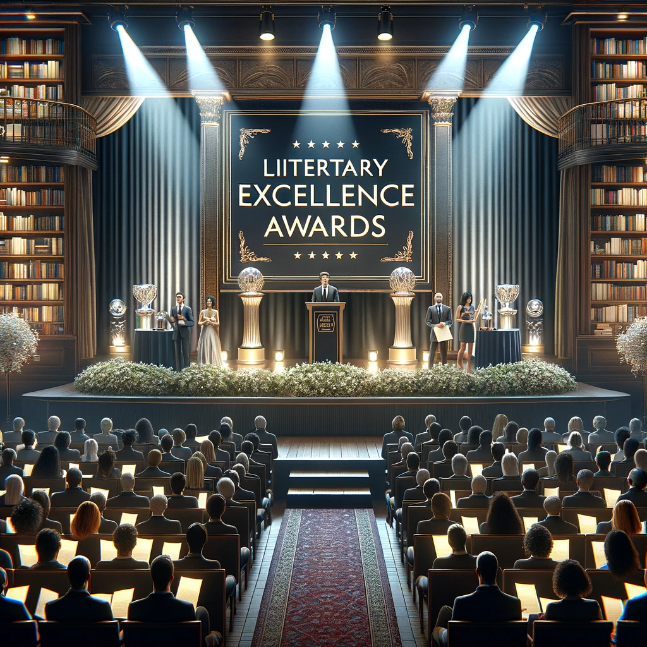The Significance of Literary Prizes and Awards: A Pathway to Literary Excellence

In the literary world, recognition often comes in the form of prestigious prizes and awards. These accolades not only celebrate the exceptional talent and creativity of authors but also highlight the importance of literature in our society. From the Nobel Prize in Literature to local literary contests, awards play a crucial role in shaping the careers of writers and promoting the cultural value of their work. In this article, we will explore the significance of literary prizes and awards, their impact on authors and readers, and some of the most renowned literary accolades around the world.
The Role of Literary Prizes and Awards
Recognition of Talent
Literary prizes and awards serve as a powerful tool for recognizing and celebrating outstanding literary achievements. They acknowledge the hard work, dedication, and creativity of authors, bringing their work to the forefront of the literary community and the public eye. This recognition can be life-changing for writers, providing them with the validation and motivation to continue their craft.
Boosting Visibility and Sales
Winning a literary prize or award often leads to increased visibility and sales for the author’s work. Readers and publishers alike pay attention to award-winning books, leading to higher sales, more book signings, and additional opportunities for authors. This boost in visibility can also lead to translations into other languages, expanding the reach of the author’s work to a global audience.
Enhancing Literary Careers
For many authors, literary prizes and awards can be a stepping stone to greater opportunities in their careers. These accolades can open doors to new publishing contracts, literary agents, and speaking engagements. They also enhance an author's reputation and credibility within the literary community, often leading to a long-lasting impact on their career.
Promoting Literary Excellence
Literary prizes and awards promote a culture of excellence in writing. They set a high standard for literary quality and encourage authors to push the boundaries of their creativity. By celebrating exceptional works, these awards inspire other writers to strive for excellence in their own writing, contributing to the overall quality of literature.
Notable Literary Prizes and Awards
The Nobel Prize in Literature
Arguably the most prestigious literary award, the Nobel Prize in Literature is awarded annually to an author who has produced outstanding work in the field of literature. Established in 1901, this award has honored some of the most influential writers in history, including Gabriel Garcia Marquez, Toni Morrison, and Kazuo Ishiguro.
The Pulitzer Prize
The Pulitzer Prize is one of the most respected awards in American literature. Established in 1917, it honors achievements in journalism, literature, and musical composition. The Pulitzer Prize for Fiction is awarded to distinguished works of fiction by American authors, such as Harper Lee's "To Kill a Mockingbird" and Colson Whitehead's "The Underground Railroad."
The Booker Prize
The Booker Prize, formerly known as the Man Booker Prize, is awarded annually for the best original novel written in the English language and published in the UK. This award has a significant impact on book sales and is known for recognizing both established and emerging authors. Past winners include Salman Rushdie for "Midnight's Children" and Margaret Atwood for "The Testaments."
The National Book Award
The National Book Award is an annual U.S. literary prize that celebrates the best in American literature. Established in 1950, it recognizes works in four categories: Fiction, Nonfiction, Poetry, and Young People's Literature. Winners include renowned authors like William Faulkner, Joyce Carol Oates, and Jesmyn Ward.
The Hugo Awards
The Hugo Awards are the premier awards for science fiction and fantasy literature. Named after Hugo Gernsback, the founder of the pioneering science fiction magazine "Amazing Stories," the awards have been presented annually since 1953. They honor the best works in the genre, including novels, short stories, and related works. Notable winners include Isaac Asimov, Ursula K. Le Guin, and Neil Gaiman.
The Edgar Awards
Named after Edgar Allan Poe, the Edgar Awards are presented annually by the Mystery Writers of America. These awards honor the best in mystery fiction, non-fiction, television, film, and theater. Celebrated winners include Stephen King, Gillian Flynn, and Tana French.
The National Book Critics Circle Award
The National Book Critics Circle Award, established in 1974, is awarded by the National Book Critics Circle to honor outstanding writing and fosters a national conversation about reading, criticism, and literature. Categories include Fiction, Nonfiction, Poetry, Memoir/Autobiography, Biography, and Criticism.
The Newbery Medal
The Newbery Medal is awarded annually by the American Library Association to the author of the most distinguished contribution to American literature for children. Named after the 18th-century British bookseller John Newbery, it is one of the most prestigious awards in children's literature. Notable winners include Madeleine L'Engle for "A Wrinkle in Time" and Lois Lowry for "The Giver."
The Costa Book Awards
The Costa Book Awards, originally known as the Whitbread Book Awards, have been recognizing outstanding books by writers based in the UK and Ireland since 1971. The awards are given in five categories: First Novel, Novel, Biography, Poetry, and Children's Book. An overall Book of the Year is also selected from the category winners.
The Women’s Prize for Fiction
The Women’s Prize for Fiction, formerly known as the Orange Prize, is awarded annually to the best full-length novel of the year written by a woman. It celebrates excellence, originality, and accessibility in women's writing from around the world. Previous winners include Zadie Smith for "On Beauty" and Chimamanda Ngozi Adichie for "Half of a Yellow Sun."
The International Dublin Literary Award
The International Dublin Literary Award, sponsored by the Dublin City Council, is awarded annually for a novel written in English or translated into English. With one of the richest literary prizes globally, it recognizes novels of high literary merit. Winners include Herta Müller for "The Land of Green Plums" and Colm Tóibín for "The Master."
The Prix Goncourt
The Prix Goncourt is one of the most prestigious French literary awards. Established in 1903, it is awarded annually to the author of "the best and most imaginative prose work of the year." Past winners include Marcel Proust, Simone de Beauvoir, and Michel Houellebecq.
The Bailey's Women's Prize for Fiction
Another prestigious award recognizing women writers, the Bailey's Women's Prize for Fiction, celebrates excellence, originality, and accessibility in writing by women throughout the world. Notable winners include Madeline Miller for "Circe" and Ali Smith for "How to be Both."
The PEN/Faulkner Award for Fiction
The PEN/Faulkner Award for Fiction is awarded annually by the PEN/Faulkner Foundation to the author of the best American fiction book of the year. It honors literary excellence in the tradition of William Faulkner, with past recipients including Philip Roth, Ann Patchett, and Don DeLillo.
The Bram Stoker Awards
Named in honor of Bram Stoker, the author of "Dracula," these awards are presented annually by the Horror Writers Association for superior achievement in dark fantasy and horror writing. Winners include Stephen King, Neil Gaiman, and J.K. Rowling.
The John Newbery Medal
The John Newbery Medal is a prestigious award given annually to the author of the most distinguished contribution to American literature for children. Named after John Newbery, an 18th-century British publisher of children's books, it has honored authors like Beverly Cleary for "Dear Mr. Henshaw" and Kate DiCamillo for "The Tale of Despereaux."
The Nebula Awards
Presented by the Science Fiction and Fantasy Writers of America (SFWA), the Nebula Awards recognize outstanding works in the genres of science fiction and fantasy. Established in 1965, they honor novels, novellas, and short stories, with notable winners including Arthur C. Clarke, Anne McCaffrey, and N.K. Jemisin.
The Lambda Literary Awards
The Lambda Literary Awards, or "Lammys," are presented annually by the Lambda Literary Foundation to celebrate excellence in LGBTQ literature. Categories include fiction, nonfiction, poetry, and more, with past winners including Michael Cunningham, Alison Bechdel, and Roxane Gay.
Conclusion
Literary prizes and awards play a vital role in the literary world by recognizing and celebrating the achievements of authors. They provide a platform for writers to gain visibility, boost their careers, and promote literary excellence. From global accolades like the Nobel Prize in Literature to national and genre-specific awards, these honors contribute to the rich and diverse landscape of literature. For readers, literary prizes and awards serve as a guide to discovering outstanding books and authors, enriching their reading experience and deepening their appreciation for the written word. Whether you're an aspiring author or an avid reader, the world of literary awards offers a wealth of inspiration and excellence worth exploring.



